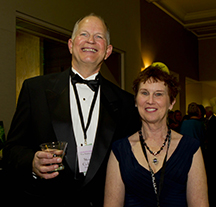Nonprofit marks 150 years, but last 10 a doozy
Kathryn Roberts, president & CEO, and Steve Ordahl, senior vice president of business development, celebrated Ecumen’s 150th anniversary at a gala last month.
 Nonprofit marks 150 years
Nonprofit marks 150 years
Kathryn Roberts, president & CEO, and Steve Ordahl, senior vice president of business development, celebrated Ecumen’s 150th anniversary at a gala last month.
article by Nick Backus/Editor, Shoreview Press
SHOREVIEW (Dec. 18, 2012) — Forget Ecumen being a 150-year-old organization for a moment.
Some would say the Shoreview-based senior housing provider didn’t come of age until just 10 years ago, when current CEO Kathryn Roberts stepped on board.
“We were a sleepy and shy Lutheran organization,” Roberts said of Ecumen in 2003, then called the Board of Social Ministry.
But then the proverbial snoozing churchgoer with his head down in the back pew woke up and moved to the front. Since 2006, Ecumen has radically diversified its revenue streams, transforming from mostly nursing home beds to housing and services such as independent and assisted living as well as in-home care.
Reported revenues for 2011 were $126 million and are forecast at $148 million for 2012. The number of units housing and memory care units surpassed those of nursing homes in the middle of last decade, and a similar trend in revenues isn’t far behind.
From 2006 to 2011, nursing home units dropped from 901 to 638 while assisted-living and memory care units shot upward from 1,200 to 1,800. In terms of revenue, market-rate housing continues to explode, while nursing home revenues have tapered off in recent years.
For Ecumen, this is all a good thing.
“We’ve significantly changed and our service mix has gotten much broader,” said Andrea Marboe, Ecumen’s communications manager. “The majority of what we offer is something seniors would choose as opposed to being a last resort.”
That’s to say nothing of Roberts being at the helm to help Ecumen turn an operating surplus, or nonprofit-speak for profit margin. Yet she maintains they are slim, as fitting for such an agency.
Coincidentally, Roberts grew up just a block or two from Ecumen’s Shoreview headquarters. When she goes for walks, she sees some of her old neighbors.
The 61-year-old had developed a big-thinker and problem-solver’s reputation.She was tapped by then-governor Jesse Ventura to sue Major League Baseball on behalf of the Metropolitan Council, ultimately stopping the contraction of the Minnesota Twins. She also led a transformation of the Minnesota Zoo, becoming the first woman to lead such an operation when she was appointed at age 34.
Last month, she and others at Ecumen hosted a community forum discussing how to maintain Shoreview as an “age-friendly community.” Ideas ranging from as small as benches at Cub Foods to as broad as universally-designed homes were discussed, and several follow-up meetings are in the works.
According to the 2007 study by the Minnesota State Demographic Center, senior population growth is expected to more than double in the Twin Cities area by 2030. Baby boomers, or the seniors of 2030, currently make up 26 to 31 percent of suburban and exurban populations. Cities might strive to keep housing senior-friendly, but there isn’t an exact crystal ball as to what northeast metro communities will look like demographic-wise in the next 10-15 years, Roberts said.
“Boomers were the first generation with a chance to go to college and change careers more than once,” she explained. “We’ll be much more open to moving because we’ve already done it 20 times in our lives.”
If seniors want to move, one thing is for certain: Ecumen believes in a full menu of care options. Roberts offered up an analogy of when she was a child, and her daycare was either the neighbor or her father when he was home. With today’s workforce of boomer women, a plethora of daycare services have sprung up: licensed, home, company-offered and more.
Although she might have awakened the sleeping Lutheran in the back pew, Roberts said she’s not ready to leave Ecumen as the senior population precipice nears.
“We’re going to have a huge explosion in services outside of our buildings,” she said. “The aging population means a lot of business for us.”
